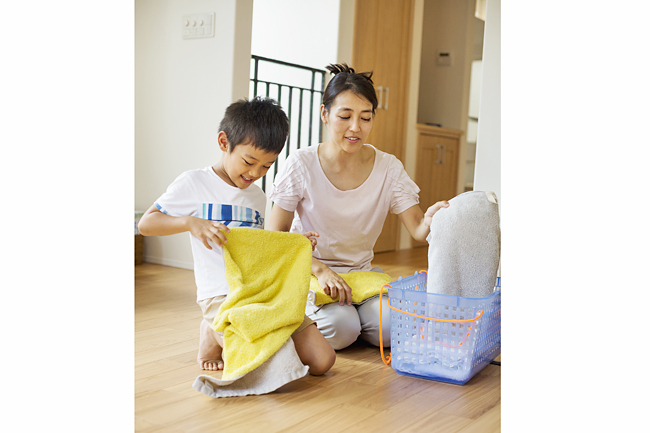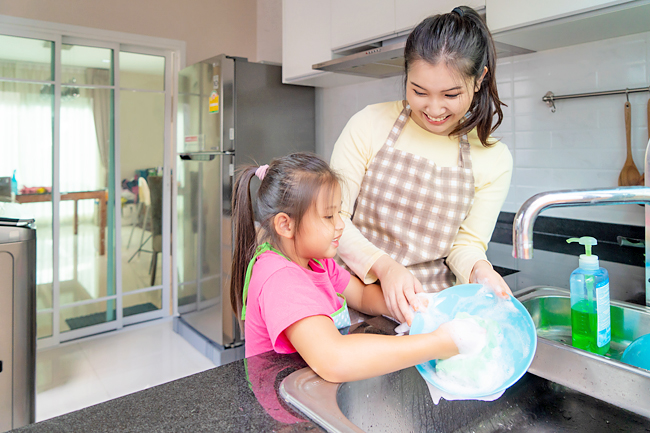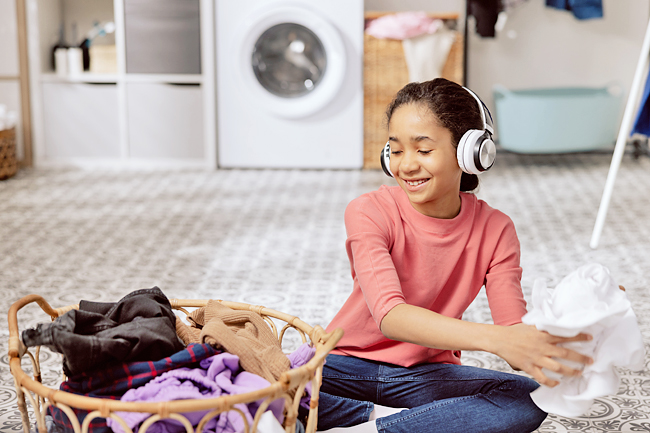Dan Hurley
THE WASHINGTON POST – Developmental paediatrician Andrew Adesman at the Zucker School of Medicine at Hofstra University, has a confession to make. Although he has published two scientific studies of the ability of children to do chores, he and his wife, also a paediatrician, never insisted on their own kids doing them. “You might think for two parents working full time, it would be important for their kids to do chores,” he said. “We probably set the bar too low. You get into routines. You pick your battles.”
Getting kids to do chores is a problem for many parents, said chief of paediatric psychology Elena Mikalsen at Children’s Hospital of San Antonio. “One of the top three questions I get at our paediatric mental health clinic is, ‘How do I get my kid to do chores? Why does my kid never want to do them?’” she said.
A key to avoiding conflicts over chores is to start young. “If you come to me with a 16-year-old and this is the first time they are being asked to do chores, you have already lost that battle,” Mikalsen said. “It is too late by then. I teach parents to start early, as early as 18 months, certainly by age two.”
The time and attention it takes to involve toddlers in household chores pays off in more than a clean home, said developmental paediatrician Rebecca Scharf at the University of Virginia, United States. She published a paper in 2019 involving more than 9,910 children whose parents reported the frequency with which they performed chores.
The more they had done in kindergarten, she found, the more likely they were to report feelings of social, academic and life satisfaction by third grade.



On the other hand, she found, “children who rarely performed chores had greater odds of scoring in the bottom quintile on self-reported prosocial, academic ability, peer relationships and life satisfaction scores”.
Every child is different, and developmental challenges such as ADHD can make it difficult for some kids to engage in chores. But parents should not make the mistake of underestimating what most kids can do around the house.
Here is an age-by-age guide to the chores kids are capable of as they grow, beginning with toddlers and continuing up to college age:
12 TO 18 MONTHS
“It depends on the child, but by 18 months, most kids want to help,” Mikalsen said. “It makes them feel good to do stuff. If they left puzzle pieces on the floor, you can say, ‘Oh my goodness, look at the floor! What a mess! We can put that puzzle away!’ It has to be good-natured and you will want to do it with them. Put one of the pieces in the box and say, ‘Can you pick up that piece over there?’”
Montessori teacher Simone Davies for over 15 years and the author of two books on raising children with the Montessori method, said it is important to lay the foundation starting as young as 12 months.
“If I am preparing bananas for the classroom, they can sit down with me,” Davies said. “I show them how to peel the bananas and put the skin in a compost bin. It is not about forcing them. They actually love helping out when the tasks are age-appropriate and simple.”
In the bedroom, young toddlers can put their dirty clothes in the hamper, take off their socks, get their pyjamas from a bottom drawer, and put on clothing with assistance, Davies said.
In the bathroom, they can brush their own hair, wash their hands, hang up a towel and brush their teeth with assistance.
18 MONTHS TO THREE YEARS
By 18 months to three, Mikalsen said, “That is when they start following the parent around and mimicking everything the parent does. As soon as they do, it is when you start teaching them about cleaning up or even cooking. Parents can get play kitchens with little pots and pans.”
Developmental psychologist Dona Matthews who has researched children and chores, recommended that parents buy a child-sized broom and dustpan set.
“The little ones often love to imitate you as you are sweeping or vacuuming,” she said. By age three, many children are capable of dressing themselves with a little help, Davies said.
“Parents are often surprised when they see how much they are capable of in the classroom,” she said. “They are clumsy and it is often a collaboration between parent and child. But it is also lots of fun.”
Toddlers can help make their own bed, sweep the floor, water plants, put on a coat or hang it up on a hook, and even wash the dishes.
“I usually have to wash the dishes again after they are done,” Davies said, “but they really enjoy it.”
To help them set the table, she uses place mats with pictures showing where to place a bowl, cup and cutlery.
With food preparation, Davies said, “I see a big jump around age two. They can spread cheese on a cracker or open the refrigerator to get a snack you keep within reach for them.”
FOUR TO FIVE
By the time a child reaches four, they can be given regular responsibility for certain routine chores, Matthews said.
“They could be the one who keeps the cat water dish full,” she said. “Or they can help unload the dishwasher. One of my grandsons has always been interested in the mail. When the mailman comes, he is excited. So his parents gave him the job of bringing in the mail every day.”
Davies said that by age four, children should be able to fold laundry, measure and mix baking ingredients, assist with cooking, put clothes in their drawers, wipe themselves after using the toilet with assistance and wash their own hair using travel bottles, preferably, so they avoid emptying a standard container of shampoo.
“You are doing it together with them, so they see it as fun,” said Mikalsen. “You can hand them a broom or mop and say, ‘I will clean this corner, you clean that corner.’ Or they can be outside with you on the lawn, doing yard work.”
SIX TO 12
By elementary school, most children are ready to help make dinner, put away groceries, walk a pet and keep their room clean on their own with occasional help. “Less is more,” Davies said. “If they have so many clothes that you are not able to put them away in the wardrobe, get rid of them. You need a place for everything and everything in its place.”
By seven or eight, children should be able to handle their laundry by putting dirty clothes in a hamper and then into the washer and dryer, Davies said. “It is an evolution,” she said. “It is not like one day you announce, ‘Oh, you are responsible for the laundry.’ First they are helping you, seeing how you do it, then they are doing it by themselves.
By 10, her son Oliver was cooking dinner for the family once a week on Sunday evenings.
“He would choose a recipe from a simple cookbook,” Davies said. “He would write a shopping list, and sometimes he even did the shopping while I stood out front. Once we were back home, I would be like the sous chef.”
13 TO 18
Once in middle school and beyond, the average kid should be able to do chores that adults do, such as cleaning the bathroom, washing the car, raking leaves, mowing the lawn, and making simple meals like frying hamburgers or fixing a sandwich, Matthews said.
Somewhat paradoxically, though, the years your child is the most capable of doing chores might be the years where parents need to back off a bit. When it comes to bedrooms, Matthews urged parents to think of them as a special case in the home.
“Their own room is the one place where my advice to parents is to go easy on them,” she said. With the exception of food, which should not be rotting in there, “if they want to live in a sty and are looking for a sweater but it is under a pile of dirty laundry and it does not smell good, so be it”, said Matthews. “In the interest of their own sense of autonomy and independence, let it be.”
Beyond the bedroom, Matthews said to focus on what is more important. Is it your relationship with your teenager or your dishes?
“It is so tempting to let your ego get involved, and it can very quickly escalate into an acrimonious conflict,” she said. “Instead, you need to trust in the relationship. Give them some space, give them some time. Once you are both calm, you can have a talk.”
Mikalsen agreed. “Parents are stressed,” she said. “For years, psychologists have sent a message that it is important for children to have chores, that parents must make them do their chores, and if not, they must be punished. It is the wrong message. You have to pick your battles and not overwhelm your child on top of everything else.”
In other words: Go easy on your kid, and easy on yourself, too.










